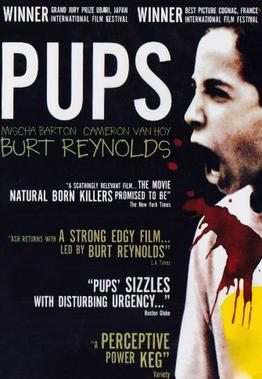Content:
Undeveloped moral worldview, including discussion of the design argument for the existence of God, that presents the problems regarding teenage violence in America, & most of the causes, including the effects of media violence, but offers no solutions, even non-biblical ones; 251 oscenities & 28 profanities plus some crude remarks & obscene gestures; extreme violence avoided but many threats of violence uttered by two young teenagers plus 13-year-old boy jokingly puts noose around his neck at home, fires two shots [one misfire] at home, holds up bank, wounds security guard & handicapped man, & threatens people with gun, but is punished for his crimes; some crude sexual references & 13-year-old girl starts her menstruation cycle; no nudity; alcohol use; smoking & minor character secretly smokes marijuana while being held hostage; and, strong pagan and other miscellaneous immorality such as mother neglects 13-year-old, who goes on a violent rampage, most of which, however, is eventually rebuked at one time or another.
More Detail:
Before the recent tragic events in Littleton, Colorado, deadly school shootings in America in 1998 inspired British movie director Ash to write and shoot PUPS in less than two months. Starring Burt Reynolds as an FBI agent and two talented young newcomers named Cameron van Hoy and Mischa Barton as two confused 13-year-olds, this small independent movie is a fascinating, but uneven, look at some of the causes behind the violent actions of America’s susceptible “Baby Kaboom” Generation.
“The script was inspired by the horrific events of 1998,” writer Ash told MOVIEGUIDE at the Los Angeles Independent Film Festival April 18, two days before the events in Littleton. “I was trying to figure out why kids are doing these things. What was interesting about many of the interviews that I read, was that, frequently, the kids didn’t know themselves. I think the kids are over-saturated with violence in the media. Also, at 12 or 13-years-old, you never think you’re going to die. You don’t realize the consequences of your actions. Hopefully, my film tries to provoke questions.”
Ash was true to his word in this minor gem of a movie, even though PUPS does not provide any solutions and is full of strong, offensive foul language. The story opens with a close-up of 13-year-old Stevie, an asthmatic boy from Chatsworth, Calif., a suburban city in the crowded San Fernando Valley of Los Angeles. Played by Cameron van Hoy, a young Baptist stage actor from Los Angeles, Stevie is talking to himself in a hand-held video camera. The movie camera pulls back to reveal that Stevie has tied a noose around his neck and hung it from the ceiling fan. Stevie jokingly pretends that he’s on the verge of suicide, but then gets bored with this macabre gag and starts rumaging around his mother’s bedroom. (Later, it is learned that his divorced mom has left Stevie alone while she attends a professional seminar of some kind.)
When he finds a gun in his mother’s closet, Stevie is anxious to show the weapon to his girlfriend, 13-year-old Rocky, played by another movie newcomer named Misca Barton. Rocky comes to Stevie’s house to walk with him to school that morning. At Stevie’s house, these two aimless youths talk about running away, their language peppered by obscenity and profanity. “We’ve got to get out of here,” Stevie says. “This city is killing me.” Before they head off for school, Stevie shows the weapon to Rocky and tests to see if it’s loaded. When it misfires, he points it at Rocky, but after she tells him angrily to stop, he tests it at the wall again and (surprise!) it goes off.
On the way to school, Stevie impulsively decides to rob a small local bank. With Rocky reluctantly but excitedly tagging along, he waves his new macho toy around, shouting at people and telling them to watch out because, “I’m psycho!” After getting some money from the tellers and the manager, Stevie and Rocky start to leave, but just then the cops arrive, so Stevie and Rocky hold the employees and three customers hostage. Of course, Stevie and Rocky don’t know it, but the security is in the bathroom, and he’s gathering his courage to enter the lobby and shoot it out with the young criminals.
Eventually, Stevie wounds the security guard, and he and his apprentice in crime, Rocky, begin negotiations with FBI agent Daniel Bender, played by Burt Reynolds in one of his best performances. Stevie orders people around, gains sympathy from one of the customers, a bitter, handicapped war veteran portrayed unevenly by Adam Farrar, the half-brother of Leonard DiCaprio, and tries the patience of an elderly customer, played by Ed Metzger in another uneven performance.
At one point, Stevie demands an interview with MTV of Cable TV, and MTV’s famous news anchor Kurt Loder shows up, portraying himself. This is one of the movie’s most interesting scenes. Cameron van Hoy fabulously reveals Stevie’s confusion, ranging from angry to philosophical. The philosophical moment comes when Loder asks Stevie if he believes in God. Rightfully, Stevie says, on the one hand, he does believe in God when he looks at the intelligent, beautiful design of the universe. Incorrectly, though perhaps understandably, Stevie says, on the other hand, when he looks at all the bad things in the world, he does not believe that God exists. Of course, Stevie’s confusion is just what one would expect from a mixed-up teenager trained to kill by the secular, socialistic, nihilistic, pseudo-intellectual, pseudo-compassionate, violent, and perverted amusements of much of today’s mass media of entertainment.
Shot in a guerrilla style in only 16 days, PUPS reflects the unevenness by which such cinema can be overcome. Holding the movie together are the nearly perfect performances by Burt Reynolds and Kurt Loder and the strong, though not fully successful, performances by van Hoy and Barton as the confused young teenagers, Stevie and Rocky. Regrettably, PUPS offers no answers or solutions to the problem of teenage violence, although it correctly points a finger at media violence and absentee parents. The movie also contains a whole lot of foul language, especially from Stevie, some crude sexual references and remarks, and lots of other irresponsible behaviors that may be harmful to susceptible people. Hopefully, however, the shock of watching Stevie wave a gun around won’t inspire any copycat crimes, especially since he suffers for his crimes in a significant way at the end of the movie.



 - Content:
- Content: 






